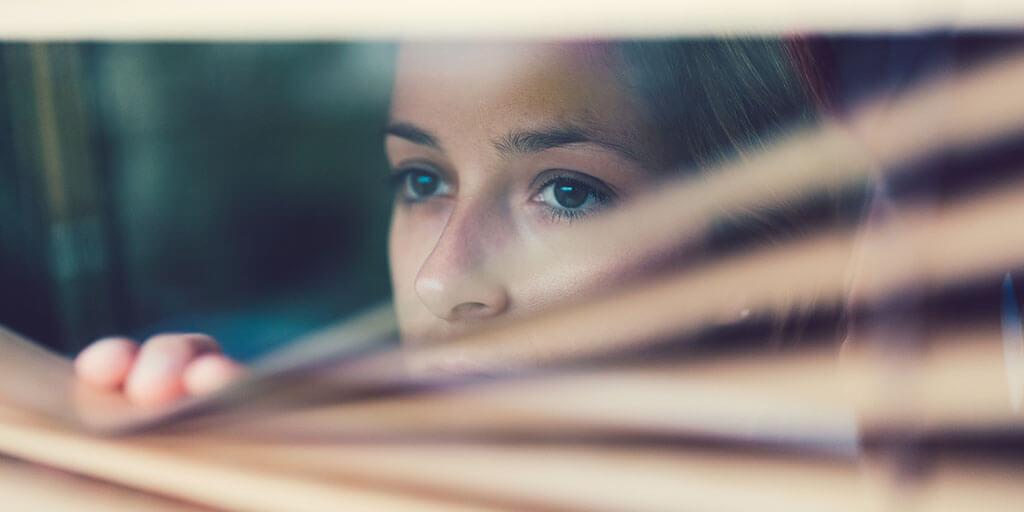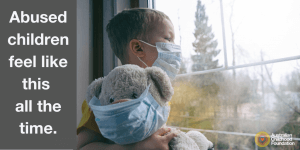
Abused children feel like this all the time
Without knowing it, all of us have experienced a little of what abused children feel like all the time. Of course, abuse is perpetrated in children’s families or the in the institutions that they take part in. The trauma of abuse is far worse for children than the experience of COVID-19 has been for all of us. But in a real way, COVID-19 has given us the insight that none of these children can afford for us to forget.
This post was written by Dr Joe Tucci, CEO of the Australian Childhood Foundation.
At some point, COVID-19 has made us all feel vulnerable. We have been worried about our jobs, our health, and how far-reaching its impact will be. We have been afraid that we might lose someone we love to the virus. We have shared the sadness felt by strangers whose parents and grandparents have died alone.
As we touched the fear that we are all feeling, we have come to know more about fear itself. We have come to know what it is like for those who live with threat all the time. We have become more sensitive. We have become more aware, more willing to understand.
Without knowing it, all of us have experienced a little of what abused children feel like all the time.
Of course, abuse is perpetrated in children’s families or the in the institutions that they take part in. The trauma of abuse is far worse for children than the experience of COVID-19 has been for all of us. But in a real way, COVID-19 has given us the insight that none of these children can afford for us to forget.
COVID-19 took control away from us. As the virus hit, governments reached into our lives and restricted what we could do. We were not allowed to meet in large numbers. We stopped being able to go to the cinema. We could not travel without a good reason. Shops, cafes and restaurants shut. People lost their jobs overnight. They were forced onto unemployment benefits. These were choices made by others and imposed on everyone. We had no say in it. We had no way to influence it.
Some refused to listen and obey the rules. Some would not give up their individual freedoms. They fought against the changes. They wanted their lives back the way it was before.
The loss of control also happens to abused children over and over again.

Children who experience family violence are forced to live with that violence. They cannot stop it. They cannot change it. They suffer in silence knowing that if they tell, then someone in their family could get even more hurt.
Children who experience sexual abuse are manipulated into believing that it is normal despite it being a lie. They have no control over when the abuse occurs or for how long. They have no control over whether their abuse is recorded and sold over the internet to other sex offenders. They have no choice about whether they can reveal their abuse to anyone. They are threatened not to disclose. They are made to feel that they are responsible.
When children are removed from the adults who are dangerous to them, they are frequently made to leave their family home. They are forced to live with people who they might not know. They are forced into trusting strangers to look after them. They have to get used to new routines, new pets, new homes. They have no choice about what schools they go to. They sometimes stop being able to live with their brothers and sisters.
In the face of this lack of control, some abused children give up.
They know they cannot change what happens to them. They are overcome with sorrow. They stop trying. They do not participate in their own lives. Others fight long and hard to try and take back their sense of control. They are angry. They feel that life is not fair. Their behaviour gives the impression that they do not care about the consequences. But that is far from the truth. They want to experience their lives without the trauma, without the pain. They want their childhood back.
COVID-19 has made the world feel insecure. We are worried that we will get sick. We are scared that people we know and love might die. The virus is an invisible killer that spreads without us knowing that it is. The risks do not stop. We can no longer take for granted that we are safe like we once were. We have a sense of panic that never goes away.
 Abused children feel danger lurking around them all the time. They do not know when they will be violated again. They do not know if the next time the violence erupts that someone will not be killed. They are scared. They are restless. They do not sleep. They carry with them a deep sense of distress that also never goes away. They need to feel safe, but they can’t.
Abused children feel danger lurking around them all the time. They do not know when they will be violated again. They do not know if the next time the violence erupts that someone will not be killed. They are scared. They are restless. They do not sleep. They carry with them a deep sense of distress that also never goes away. They need to feel safe, but they can’t.
COVID-19 has made us feel disconnected from others. We have felt alone. We have missed our extended family and our friends. Our worlds have become smaller. We have started mistrusting people because they may infect us with the virus. Our relationships have changed. Paradoxically, we have had to keep our distance in order to keep ourselves and others well.
Abused children can feel alone even in a crowd. They lose the sense of being accompanied through life with love and care. They are experts at social distancing because they protect themselves by putting up walls to keep people out. They find it hard to trust because they have been hurt by the very adults who were supposed to look after them. Their pleas for help have been ignored. Children abused in schools, churches and other institutions feel betrayed by their whole community. They wait for someone to take responsibility for what has been done to them. This accountability rarely comes. For them, relationships are best to be avoided.
For all of us, COVID-19 has felt like it will never end. At its worst, we lost hope that we would beat it. We found confidence again only when we felt like we were facing the pandemic together. We have become more attuned to what we each need. We have reached out with understanding to our front line workers in hospitals, supermarkets and schools. We have acted with compassion to the older generation, glimpsing in them what it was like to live through war or depression. As we have opened ourselves to the experience of others, we have become a little stronger.
Vulnerable and hurt children need understanding. This crisis has only amplified what they have always felt – frightened, alone, confused, without a sense of hope that their lives can be different. We have been touched directly by disruption and threat. We can never again say that we don’t know about the trauma that lives in the hearts of children affected by abuse and family violence.
We know now how society can be crippled by an invisible problem that is not tackled effectively. If we want to make our experiences of COVID 19 count for something, then we need to do more to stop child abuse and family violence. We need to do more to ensure that abused children are given the care and healing they need. We have no choice but to confront it like the emergency it really is.
